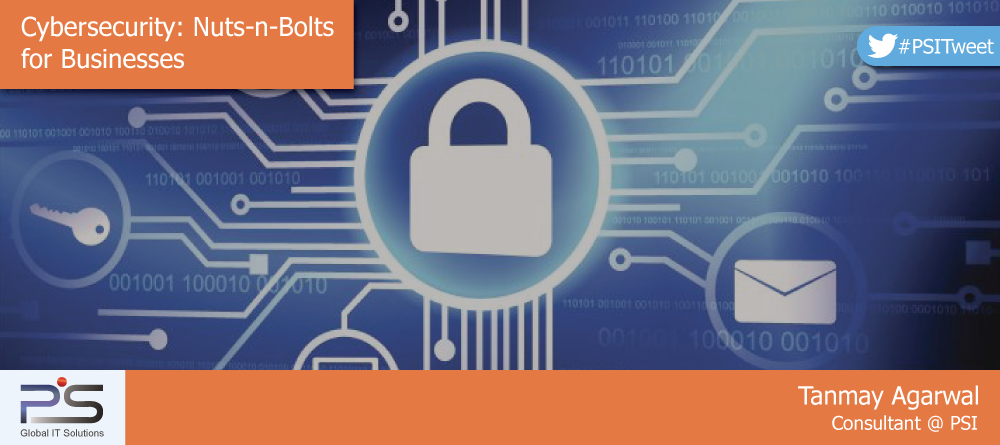With the use of internet, communication across the world has become so smooth. Wi-Fi has been growing widely with the internet allowing us to connect numerous devices for faster data exchanges. While this connectivity is wonderful, the unhappy part is that each individual connected on the internet has his/her own network, which may fall victim to larceny by the hackers.
Therefore, it is the dire need to increase the consciousness on these vulnerabilities to the netizens. This will help them keep themselves safe from the attacks. Following are some of the cybersecurity advices for the businesses:
- Remain careful on the posts you put about you and others. The way one advertises about others online, states many aspects about the person and at times may lead to some legal trouble.
- Comprehend knowledge on the business data collected and ensure its protection. One should conduct checks of the data and classify data as public or private.
- Use of various verification methods. Verification is the act of confirming an identity by comparing provided credentials against an existing database of authorized identities before allowing access to a given system or application. Verification factors include username, password, answer to security question, etc.
- Enabling SSLs on the business website. Using SSL/TLS certificates on the websites makes them more secure with https:// over the secured ports. The data transmitted over such servers is encrypted, and thus protected.
- Applying stringent passwords without their reuse. The more difficult and longer the passwords are, the safer they are.
- Up to date software versions help avoid security loopholes. The software companies work hard to create patches and updates that can fix these vulnerabilities. Thus, it becomes essential to update them as soon as the update is available.
- Regular data backup is the key to relaxed working. One should always backup the data in different locations.
- Use firewall to secure the private network from the internet connection. One can create a set of rules on the firewall, to allow and block the access to various services.
- Creation of incident response system allows the business to stay ahead of the cyber-attacks.
- Employee trainings on security is very essential. The trainings should be conducted at regular intervals to inculcate the good habits to maintain security.
- Email security is among the major requirements in most of the organizations. The hackers perform phishing attacks to get the benefits of weaknesses in cyber security related to the emails.
- Management of the business should promote cyber security in the company.
- Disaster recovery management should be part of the cyber security plan of the organisation. The inclusion of Disaster Recovery sites forms an essential part of this area.
- Networks and all the devices should be regularly monitored to find any vulnerabilities. Once found, the fixed should be applied at the earliest.
- Advantage of the cloud-based services should be availed. This is particularly useful in case of smaller and medium enterprises, which outsource the protection of their data to a larger company.
 With the use of internet, communication across the world has become so smooth. Wi-Fi has been growing widely with the internet allowing us to connect numerous devices for faster data exchanges. While this connectivity is wonderful, the unhappy part is that each individual connected on the internet has his/her own network, which may fall victim to larceny by the hackers.
With the use of internet, communication across the world has become so smooth. Wi-Fi has been growing widely with the internet allowing us to connect numerous devices for faster data exchanges. While this connectivity is wonderful, the unhappy part is that each individual connected on the internet has his/her own network, which may fall victim to larceny by the hackers.
Therefore, it is the dire need to increase the consciousness on these vulnerabilities to the netizens. This will help them keep themselves safe from the attacks. Following are some of the cybersecurity advices for the businesses:
- Remain careful on the posts you put about you and others. The way one advertises about others online, states many aspects about the person and at times may lead to some legal trouble.
- Comprehend knowledge on the business data collected and ensure its protection. One should conduct checks of the data and classify data as public or private.
- Use of various verification methods. Verification is the act of confirming an identity by comparing provided credentials against an existing database of authorized identities before allowing access to a given system or application. Verification factors include username, password, answer to security question, etc.
- Enabling SSLs on the business website. Using SSL/TLS certificates on the websites makes them more secure with https:// over the secured ports. The data transmitted over such servers is encrypted, and thus protected.
- Applying stringent passwords without their reuse. The more difficult and longer the passwords are, the safer they are.
- Up to date software versions help avoid security loopholes. The software companies work hard to create patches and updates that can fix these vulnerabilities. Thus, it becomes essential to update them as soon as the update is available.
- Regular data backup is the key to relaxed working. One should always backup the data in different locations.
- Use firewall to secure the private network from the internet connection. One can create a set of rules on the firewall, to allow and block the access to various services.
- Creation of incident response system allows the business to stay ahead of the cyber-attacks.
- Employee trainings on security is very essential. The trainings should be conducted at regular intervals to inculcate the good habits to maintain security.
- Email security is among the major requirements in most of the organizations. The hackers perform phishing attacks to get the benefits of weaknesses in cyber security related to the emails.
- Management of the business should promote cyber security in the company.
- Disaster recovery management should be part of the cyber security plan of the organisation. The inclusion of Disaster Recovery sites forms an essential part of this area.
- Networks and all the devices should be regularly monitored to find any vulnerabilities. Once found, the fixed should be applied at the earliest.
- Advantage of the cloud-based services should be availed. This is particularly useful in case of smaller and medium enterprises, which outsource the protection of their data to a larger company.
[:]









